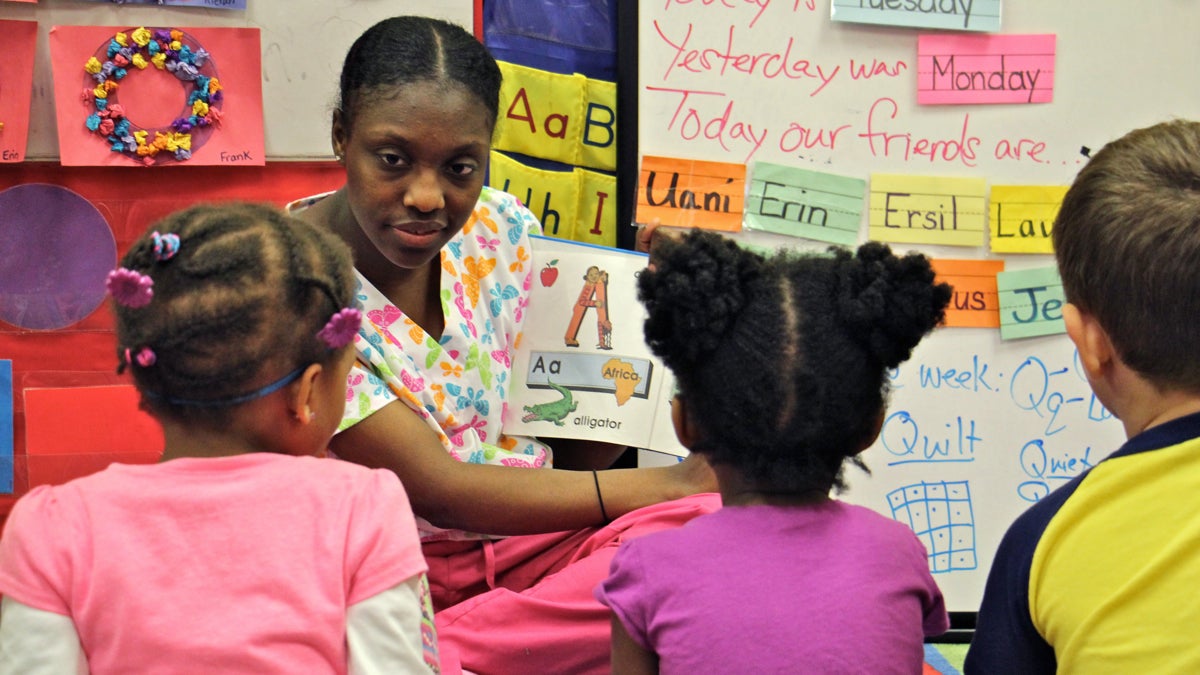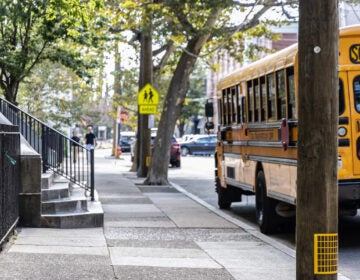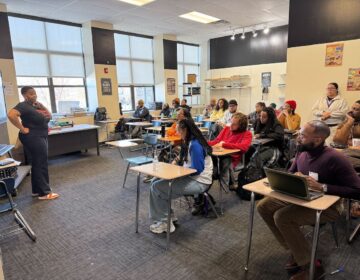With Philly pre-K money near, a renewed focus on roll out

Pre-K teacher Shirell Peaker reads with children at Little Learners Literacy Academy in South Philadelphia. (Emma Lee/WHYY)
With a final vote on Philadelphia’s sugary-drinks tax slated for Thursday, there is little doubt Mayor Jim Kenney will get much of the money he requested to expand pre-K in the city.
Now the focus shifts to how the money will be spent, which is in part what brought the mayor to the Little Learners Literacy Academy in South Philadelphia Tuesday.
Little Learners is a minnow in the child care ecosystem. Operated out of a one-room storefront on Jackson Street, the center enrolls just 12 students and employs only four teachers. And yet it finds itself smack in the middle of the present pre-K conversation — largely because of the rating it received from the state’s Keystone STARS system.
From two stars to three
Little Learners is one of the 210 child care programs in the city to receive two out of a possible four stars on the rating scale. Kenney has pledged to add around 10,000 “high-quality” pre-K seats over the next three years, but that doesn’t necessarily mean 10,000 new seats. In fact, one of the administration’s central expansion strategies will involve helping two-star centers like Little Learners make the improvements necessary to earn at least three stars. The administration considers the 206 city programs with three or four stars to be high quality.
“The ambitious expansion of quality pre-K opportunities for children depends upon more providers to enter and climb the quality rating system,” stated the mayor’s proposal for expanded pre-K.
As early as this week, the mayor’s office plans to release requests for quotations related to its pre-K rollout. One of those RFQs will be aimed at providers like Little Learners, those on the verge of a high-quality rating. Little Learners and programs like it will be eligible for 18- to 24-month provisional contracts, said Anne Gemmell, the city’s director for pre-K, that are contingent upon the recipients improving their STAR rating.
“If we don’t invest and make sure they’re at a level that ensures quality, then we’re not gonna have an improvement in kindergarten readiness,” said Gemmell. “So it’s all about getting children ready for the next part of their education. That’s the difference between early education and child care.”
There are a litany of differences between a STAR 2 and a STAR 3 child care program, and many revolve around how teachers are trained and developed. Staff in a STAR 3 facility, for instance, must have certain amounts of annual professional development, must operate under a defined salary scale that acknowledges differing levels of education, and must receive certain employee benefits.
Pay raise on the horizon?
No minimum salary requirements are associated with the state rating system, but the city is looking to use its expansion initiative as a lever to increase pre-K teacher salaries.
“We were hoping that the expansion of the pre-K seats will give [pre-K providers] more capacity to be able to pay people more money,” said Kenney on Tuesday.
The mayor’s official pre-K proposal doesn’t commit to specific salary benchmarks, but it does express a similar sentiment.
“We are committed to working with providers to remove barriers to opportunities for better wages,” the proposal said.
In a report released earlier this year, the Philadelphia Commission on Universal Pre-K laid out a recommended salary scale for city pre-K teachers. It suggested pre-K aides earn $28,000 annually, assistant teachers $32,000, and lead teachers $50,000.
If pre-K providers in the city came anywhere near those figures, it would represent a dramatic spike in sector pay. Pre-K teachers who are part of the Philadelphia Federation of Teachers and work in district schools make $42,000 a year and up. But those in the private pre-K sector make considerably less.
The average lead pre-K teacher makes about $27,000 a year, according to the commission. An analysis of sector pay funded by the William Penn Foundation found that Philadelphia teachers at the highest-rated private care providers earn between $24,000 and $44,000 a year. Statewide, preschool teachers make a scant $25,970 annually, according to a just-released report by the U.S. Department of Education. The median pay for Pennsylvania’s kindergarten teachers is almost exactly double that.
The William Penn report on teacher pay in the early childhood sector called persistently low salaries “the single most important factor limiting quality [early childhood education] and the positive child outcomes that it delivers.”
Given that the city is prepared to spend a healthy chunk of its pre-K money on the training, retention, development, and compensation of early childhood teachers, one wonders: Is there a strong link between teaching quality and early childhood student outcomes?
“The quality of a pre-K program really determines the outcomes for kids,” says Libby Doggett, who heads the U.S. Department of Education’s Office of Early Learning. “And as we know, in any educational setting the teacher is the primary driver of that quality.”
Doggett said the tie between teacher strength and student learning is “particularly important in pre-K where the children are even more reliant on the teacher than they are on each other.”
As for the direct tie between teacher pay and student outcomes, Doggett admitted research into the topic is “not great.” But she said there are at least some indications that higher pay make it easier for centers to attract employees with high-level qualifications.
‘A call beyond duty’
Then there are the anecdotes, like those of Little Learners.
Director and owner Tanisha Woods-Aiken said she can afford to pay her staff only around $12 an hour, and that’s without health insurance. She recently lost one of her star teachers to a charter elementary school where the salary was far higher and the benefits more expansive.
Even Woods-Aiken has felt the financial pain. She earns a little north of $30,000 a year as the operator of Little Learner, dramatically less than she made as a longtime kindergarten teacher for the school district. Woods-Aiken can afford the pay cut because her husband, an assistant principal, makes good money and his job comes with health coverage.
It’s freed her to do the job she loves — even if her new line of work lacks the pay, prestige, and professional attention she received teaching students just one year older.
“It’s a call beyond duty,” she said.
WHYY is your source for fact-based, in-depth journalism and information. As a nonprofit organization, we rely on financial support from readers like you. Please give today.





